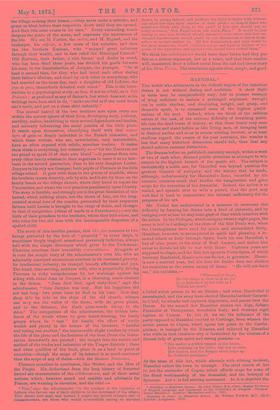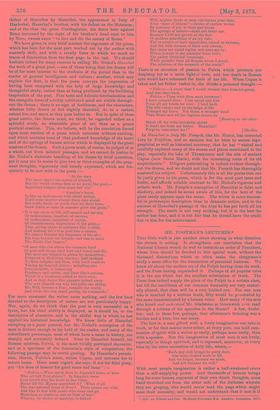IIA.NNIBAL.* THE writer who adventures in the difficult region of
the historical drama is not without daring and ambition. A short flight in verse may be comparatively easy, but to possess strength of wing sufficient to sustain a prolonged argument, wrought out in noble rhythm, and displaying insight, and grasp, and dramatic spirit, is to command some of the highest qualifi- cations of the poet. Indeed, when we think of the arduous nature of the task, of the extreme difficulty of breathing poetic life into the dead bones of history, so that these bones may once more arise and stand before us like living men, of bringing back in distinct outline and so as to arouse stirring interest, or at least studious regard, the events of far-past centuries, the wonder is less that many historical dramatists should fail, than that any should achieve eminent distinction.
The dramas before us, published, curiously enough, within a week or two of each other, demand public attention as attempts to win success in the highest branch of the poetic art. The subject is undoubtedly a noble one, for Hannibal was beyond question the greatest General of antiquity, and the history that he made, although, unfortunately for Haunibal's fame, recorded by his enemies, contains much that kindles the imagination and gives scope for the invention of the dramatist. Indeed, the action is so varied, and spreads over so wide a period, that the poet may well find it hard to concentrate the interest sufficiently for the purposes of his art.
Mr. Nichol has endeavoured in a measure to overcome this difficulty by forming his drama into a kind of chronicle, and by bridging over as best he may some gaps of time which interfere with the action. In the Prologue, which occupies twenty-eight pages, the scene is laid in Carthage at the close of the first Punic war, when the Carthaginians have sued for peace and surrendered Sicily. Hamilcar, however, is unconquered in spirit and planning a re- newed attack on Italy through Spain, leads his son Hannibal, a boy of nine years, to the altar of Baal Anunon, and makes him swear to devote his life to war with Rome. Eighteen years are supposed to elapse, and the first Act opens in Punic Spain, of which territory Hasdrabal, Reindeer's son-tn-law, is governor. Hanni- is now a married man, but his love for Imlice does not slacken his resolution as the sworn enemy of Rome. "He will not leave me," she exclaims,—
"Wheresoe'er he go, No ivy clings so close as I, no oro Is so imbedded in the hills as I Within his heart,"
a belief which proves to be an illusion ; and when Hasdrubal is assassinated, and the army have elected Hannibal as their General- in-Chief, he attacks and captures Saguntum, and passes over the Iberus. In the second Act Hannibal crosses the Alps, defeats Flaminius at Thrasymene, devastates Italy, and destroys eight legions at Cannm. In Act iii. we see the influence of the party opposed to Hannibal exerted at Carthage, from whence the action passes to Capua, which opens her gates to the Cartha- ginians, is besieged by the Romans, and relieved by Hannibal who while in that luxurious city is bewitched by the charms of a Roman lady of great spirit and strong passions :—
" She makes a golden tumult in the house, Like morning on the hills ; but vex or cross Her fancies, and the Roman blood leaps up In obstinate petulance."
At the close of this Act, which abounds with stirring incident, Hannibal enters the town in triumph. The chief events of Act iv. are the surrender of Capua, which affords scope for some of the finest workmanship of the dramatist, and the betrayal of Syracuse. Act v. is full stirring movement. In it is depicted the • Hannibal: a Hiptcrical Drama. By John Nichol, BA., Oxon., Regina Professor of English Language and Literature in the University of Glasgow. Glasgow James Maelehose. London: Macmillan and Co. 1873.
Hannibal in Italy: an Hialorieal Drama. By William Forsyth, Q0., LL.D . London: Longinus. 1872.
defeat of Marcellue by Hannibal, the appearance in Italy of Hasdrubal, Hannibal's brother, with his defeat on the Metaurus ; and at the close the great Carthaginian, his fierce hate against Rome increased by the sight of his brother's head sent to him by Nero, swears anew "to live and die the enemy of Rome."
We have given in very brief manner the argument of the poem, which has been for the most part worked out by the author with masterly skill, and with a steady force in which we mark no traces of diminution from the first page to the last. We should hesitate indeed for many reasons in calling Mr. Nichol's Hannibal -the work of a great poet,—one of these being that the drama will be of far more interest to the students of the period than to the reader of general intelligence and culture ; another, which may explain the first, is that the poem conveys the impression of having been composed with the help of large knowledge and thoughtful study, rather than as being produced by the fertilising inspiration of the poet. Fine taste and delicate discrimination and the energetic force of a richly cultivated mind are visible through- -out the drama ; there is no sign of feebleness, and the characters, whether fully drawn or but slightly sketched, do to a certain -extent live and move as they pass before us. But in spite of these great merits, the drama must, we think, be regarded rather as a splendid study, an admirable piece of art, than as a grand poetical creation. This, we believe, will be the conviction forced upon most readers of a poem which interests without exciting, and which contains none of that profound knowledge of the heart .and of the springs of human action which is displayed by the great masters of the drama. Such a poem must, of course, be judged of as a whole, not from isolated passages, and we cannot do justice to Mr. Nichol's elaborate handling of his theme by brief quotation, yet it may not be amiss to give two or three examples of the preg- nant thoughts, vigorously and tersely expressed, which are fre- quently to be met with in the poem :— "At the start
The racer shows his notion of himself,
But the world crowns him as he gains the goal,—
Impatient temper often mars fair wit."
"A nation's heart Is like an instrument with silent strings, Until some master sweeps them into sound.
But noble deeds, or words that set their tune, Grow fruits as suns in summer grow the grain."
"It is the curse of life, self-caused and sprung Of recklessness, insatiate of success, Of restlessness, impatient of repose, Of thanklessness, ungracious to the gods,— That, giving chase to rainbows like a child, And making life's true goal into a means, We cannot breathe the fragrance of the air ; But leap beyond our bounds, and run to meet The Death that lingers."
"Of men who rise above the common herd Of goat and sheep, that butt and breed and die, The most are clipped in pieces by themselves ; Frittered in flickering fancies ; half inclined To fleet delights and then, with brief resolves Taking up languid duties ; mingling arts Irreconcilable, or balancing Prudence and valour, and their like's esteem, Which is a weakness added to their own; And so they dance like puppets jerked awry. Who sets himself one way and pulls one string, His Will, become a Fate, compels the world, And while the rest stand gazing, he commands."
For mere ornament the writer cares nothing, and the few lines devoted to the description of nature are not particularly happy. Nor, again, do we think that the poet is very successful as a lyrist, but his chief ability is displayed, as it should be, in the description of character, and in the skilful way in which he has -applied his historical knowledge. We know little of Hannibal excepting as a great general, but Mr. Nichol's conception of the man is distinct enough to lay hold of the reader, and many of the -subordinate personages, most of whom have a name in history, are sharply and accurately defined. Next to Hannibal himself, his Roman mistress, Fulvia, is the most vividly portrayed character, and as a specimen of the dramatist's style of composition, the following passage may be worth quoting. By Hannibal's permis- sion, Marcia, Fulvia's sister, enters Capua, and entreats her to -return home. Have some regard, she says, if not for filial piety, yet "for dues of honour for good name and fame" :—
"Fu/via.—What say'st thou to Aspasia's fame, or hers
Who set tall Troy ablaze? Is Sappho's verso Less fervid that the fever in her veins Burnt till the /Egean quenched it ? What of all The star-sphered loves of Jove ? Their names are wide, And like to last with yours who come and go, Blameless as shadows, and as faint of hue ! Whoe'or, by choice or mastery, is linked With mighty deeds or men out-braves your date, Your dues of honour '—chains of custom woven By jealousy of joy, to bind and break The springs of nature—shall not fetter me.
Because I will not grovel at the feet
Of goddess guardians of an icy rule, The creatures of their suppliants, raised on thrones, And fed with incense of their own esteem, But claim my equal rights, you pass me by; Whose honour is my passions' freer faith, Nor paltry Otalicius' vassalage.
While prouder than all Roman wives I stand, The mistress of the monarch of the world."
There is an elevation of passion in Fulvia which prevents our despising her as a mere light-o'-love, and her death in Roman eyes would have redeemed the fault of her life. When Capua is taken and her father rushes in, she drinks a poisoned draught :—
"Fulvius.—I swore that I would wrench thee from his grasp,
And tear thee back.
Fulvia.—Then wert thou most forsworn !
I have escaped thee. I am saved and free From all my bonds for ever. I hurl back
Thy idle curse' and on the ledge of life
Trumpet my Love. Not thine, a stronger hand Than Rome and all her legions severs us. [Running to the altar. Stand off, for with inviolable shield It fends me from my father. Hannibal!
Forgive, remember me !" [She dies.
In Hannibal in Italy Mr. Forsyth, like Mr. Nichol, has corrected Livy by Polybius, and so anxious has he been to secure topo- graphical as well as historical accuracy, that he has "visited and carefully explored many of the scenes and places mentioned in the play, especially the lake of Thrasymene and the site of ancient Capua (now Santa Maria), with the interesting ruins of its old amphitheatre." Diligent painstaking is indeed evident through- out the drama, and we doubt not that Mr. Forsyth has thoroughly mastered his subject. Unfortunately this is all the praise that can be justly given to his poem, which is for the most part tame and feeble, and affords notable contrast to Mr. Nichol's vigorous and artistic work. Mr. Forsyth's conception of Hannibal is faint and shadowy, and indeed he seems aware of this, for the hero of the piece rarely appears upon the scene. The writer is more success- ful in picturesque description than in dramatic action, and in the account of Hannibal's passage of the Alps he has put forth all his strength. The result is not very striking, but it is the best the author has done, and it is but fair that he should have the credit due to him for the achievement.



































 Previous page
Previous page